
Symposium2023
Demonstrates Voice Recognition, Text to Speech, Language Translation, OAuth2, Image Generation, Face Detection and Voice Chatbot.
Stars: 51
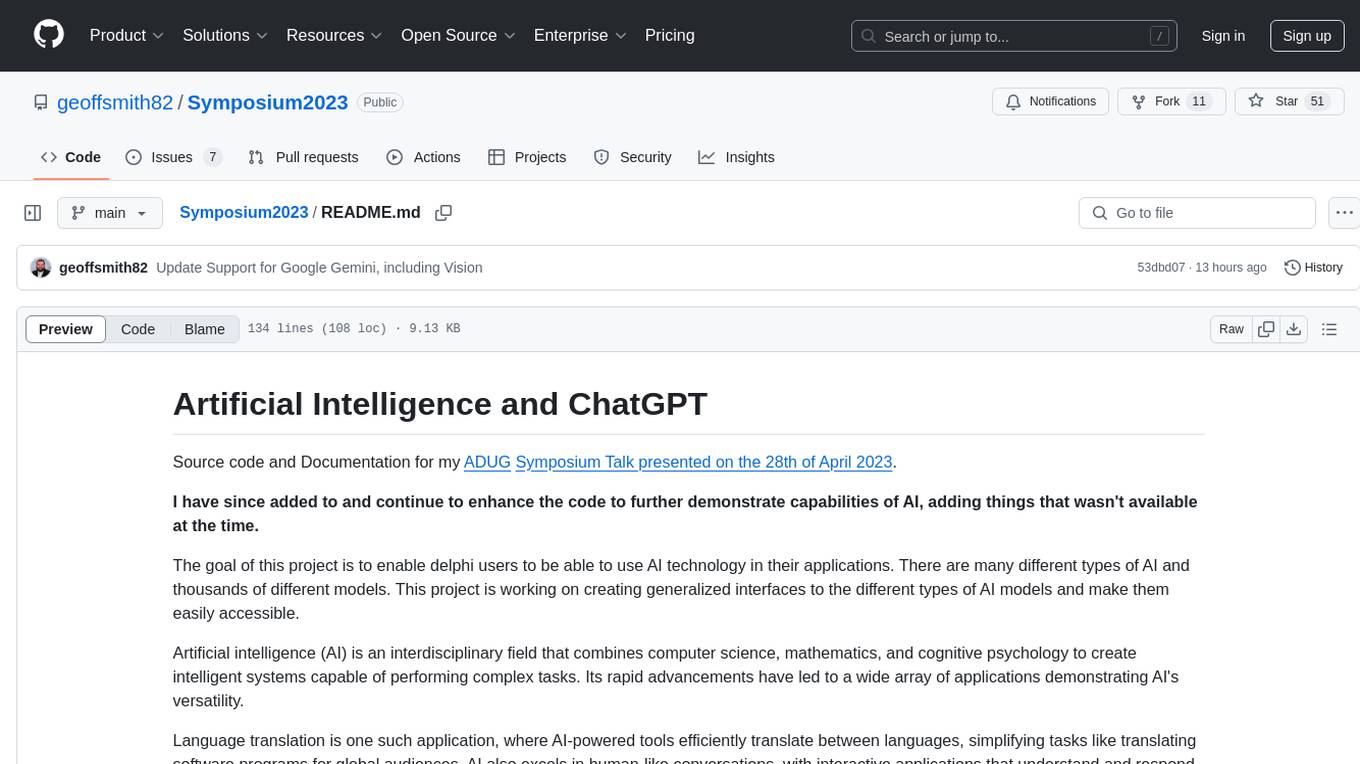
Symposium2023 is a project aimed at enabling Delphi users to incorporate AI technology into their applications. It provides generalized interfaces to different AI models, making them easily accessible. The project showcases AI's versatility in tasks like language translation, human-like conversations, image generation, data analysis, and more. Users can experiment with different AI models, change providers easily, and avoid vendor lock-in. The project supports various AI features like vision support and function calling, utilizing providers like Google, Microsoft Azure, Amazon, OpenAI, and more. It includes example programs demonstrating tasks such as text-to-speech, language translation, face detection, weather querying, audio transcription, voice recognition, image generation, invoice processing, and API testing. The project also hints at potential future research areas like using embeddings for data search and integrating Python AI libraries with Delphi.
README:
Source code and Documentation for my ADUG Symposium Talk presented on the 28th of April 2023.
I have since added to and continue to enhance the code to further demonstrate capabilities of AI, adding things that wasn't available at the time.
The goal of this project is to enable delphi users to be able to use AI technology in their applications. There are many different types of AI and thousands of different models. This project is working on creating generalized interfaces to the different types of AI models and make them easily accessible.
Artificial intelligence (AI) is an interdisciplinary field that combines computer science, mathematics, and cognitive psychology to create intelligent systems capable of performing complex tasks. Its rapid advancements have led to a wide array of applications demonstrating AI's versatility.
Language translation is one such application, where AI-powered tools efficiently translate between languages, simplifying tasks like translating software programs for global audiences. AI also excels in human-like conversations, with interactive applications that understand and respond to human language naturally. Voice recognition and real-time speech-to-text allow conversion and seamless voice-based interactions, making AI-driven applications more accessible and user-friendly.
In creative and artistic domains, AI can generate images based on textual descriptions, showcasing its capacity to understand and produce visual content. AI's computer vision capabilities enable it to accurately recognize faces and other objects in photographs and documents, illustrating its potential in visual recognition tasks and diverse applications like security and automation.
AI's ability to analyze and process data, and generate comprehensive reports highlights its value in various domains. Furthermore, AI-powered tools can transcribe audio files into written text, making transcription tasks more efficient and accurate.
The example programs below is an attempt to demonstrate the capabilities available to Delphi programmers today. I have worked on creating generic API's so that different providers can be swapped in or out to:
- experiment
- follow the current leading AI model
- make it easy to change based on price
- avoid vendor lockin
- or for any other reason.
-
ChatGPTAction
- Simple Server app that can be added to a ChatGPT GPT action to allow your computer to write delphi code. See AI Generated Delphi for some example programs created with ChatGPTAction.
-
EmbeddingsDemo
- Simple demo showing how Embeddings work
-
Talk
- Program demonstrating calling various Text to Speech API's and the different voices available (FMX)
-
Translate
- translates between languages using the various cloud API's.
- Simplify translating Delphi programs when using Delphi's built-in multi language resource support.
- DelphiChatGPT
- FaceDetection
- Weather
-
TranscribeAudio
- Upload a audio file and have it translated via a cloud speech to text api.
- VoiceRecognition
-
Image generation
- generate an image using text that you provide using OpenAI's DALLE-2 and DALLE-3 API.
-
ProcessInvoice
- from a pdf invoice extract out the important details and format as a machine readable JSON string
-
TestAPIs
- A project to test out the different API's and the functionality of the API's
| Feature | GPT-4o | Azure OpenAI Service | Groq | xAI's Grok | Anthropic's Claude | Google's Gemini |
|---|---|---|---|---|---|---|
| Vision Support | Yes | Yes | Yes | Yes | Yes | Yes |
| Function Calling | Yes | Yes | Yes | Yes | Yes | No* |
*Feature not currently supported/implementated
Create an issue and I will respond to it.
- Google - Text to Speech, LLM, Translate
- Microsoft Azure - Text to Speech, GPT, Translate
- Amazon - Text to Speech, Translate
- Anthropic claude-3-opus, claude-3-sonnet and claude-3-haiku, supporting one of largest context windows currently available (200k tokens)
- X.AI grok-beta LLM
- Replicate access a wide range of models
- Huggingface access a wide range of models
- ElevenLabs Text to Speech and Voice Cloning
- OpenAI Text to Speech, Whisper Voice Recognition, DALLE-2, DALLE-3 Image Generation, GPT4 LLM
- AssemblyAI Voice Recognition
- DeepGram Voice Recognition
- Rev.AI Voice Recognition
- Conqui-ai Run a variaty of text to speech models locally from a docker container
- CodeProject-Ai Local Face Detection.
- Each of the cloud API's need to have been setup in their respective developer consoles.
- Run the TestAPIs project and select the Settings->API Keys... menu item. Add the api for the providers you want to use.
- If you're not using a particular provider you don't need a key for it.
- Please feel free to raise issues about any questions you have about the code. I know there is a lot to this project and lots to setup, so I would like to improve the documentation to make it easy for everyone to use all the parts of this project.
- Using Embeddings to search large datasets
- Using Python4Delphi to be able to call various Python AI libraries from Delphi.
-
whisper.cpp Voice Recognition
-
RDOpenAI Delphi implementation of ChatGPT - an event based component
-
ChatGPT OpenAI ChatGPT
-
DelphiOpenAI a Delphi Library for OpenAI
-
ChatGPTPluginForLazarus An OpenAI (ChatGPT) plug-in for Lazarus IDE.
-
ChatGPT a Firemonkey ChatGPT interface written in Delphi.
-
AI-Playground-DesktopClient A Firemonkey Language model playground to access languages models like StableLM, ChatGPT, and more.
-
AI-Code-Translator Use GPT to translate between programming languages
-
TOpenALPR Open Source Number Plate recognition
-
PgVector PgVector allows storing and querying of Vectors/Embeddings in an SQL database
-
CommonVoice Public dataset of recordings for Voice Recognition
- ICS 9.0 or from the GetIt package manager built into Delphi. - For Voice recognition
- landgraf-dev/aws-sdk-delphi AWS SDK
- DelphiMVCFramework for ChatGPTAction
- https://github.com/PKGeorgiev/Delphi-JsonToDelphiClass
- Fiddler
- XML Data Binder in Delphi
For Tasks:
Click tags to check more tools for each tasksFor Jobs:
Alternative AI tools for Symposium2023
Similar Open Source Tools

Symposium2023
Symposium2023 is a project aimed at enabling Delphi users to incorporate AI technology into their applications. It provides generalized interfaces to different AI models, making them easily accessible. The project showcases AI's versatility in tasks like language translation, human-like conversations, image generation, data analysis, and more. Users can experiment with different AI models, change providers easily, and avoid vendor lock-in. The project supports various AI features like vision support and function calling, utilizing providers like Google, Microsoft Azure, Amazon, OpenAI, and more. It includes example programs demonstrating tasks such as text-to-speech, language translation, face detection, weather querying, audio transcription, voice recognition, image generation, invoice processing, and API testing. The project also hints at potential future research areas like using embeddings for data search and integrating Python AI libraries with Delphi.
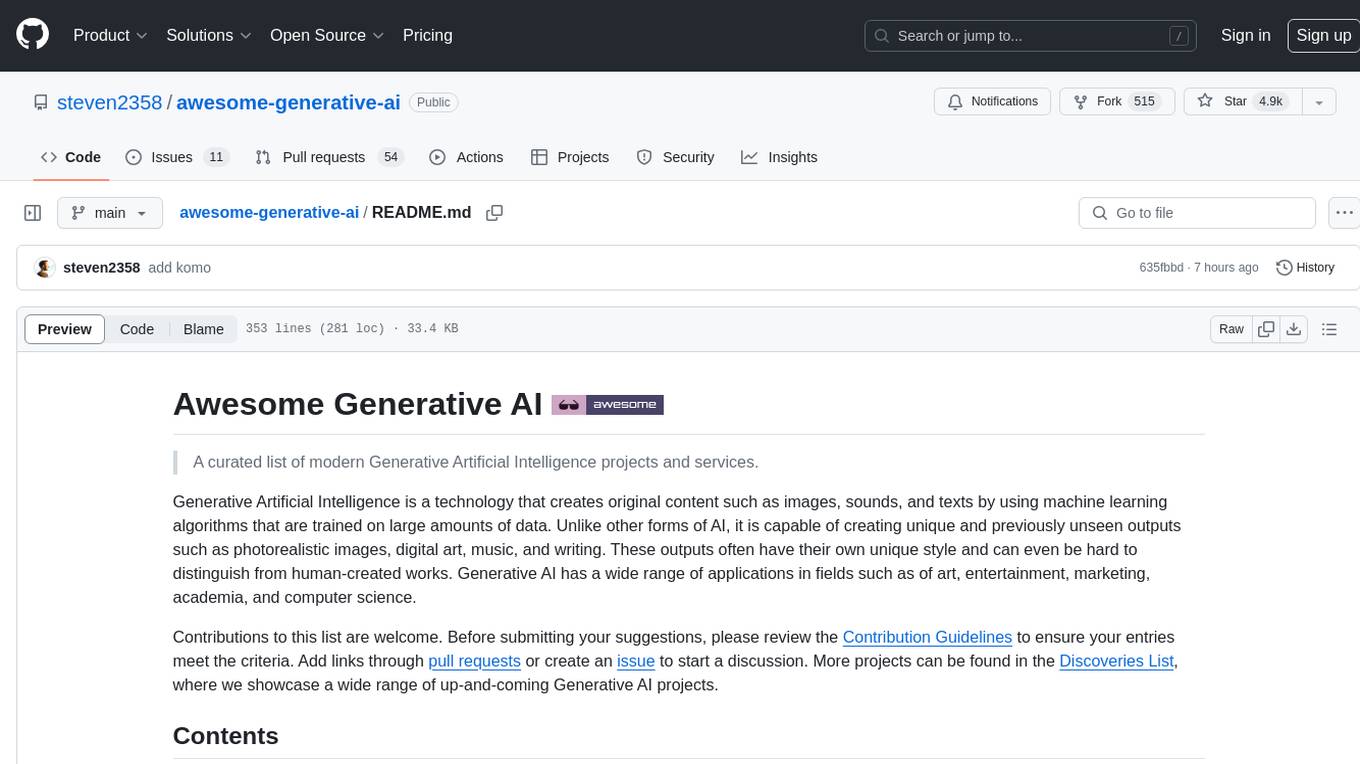
awesome-generative-ai
Awesome Generative AI is a curated list of modern Generative Artificial Intelligence projects and services. Generative AI technology creates original content like images, sounds, and texts using machine learning algorithms trained on large data sets. It can produce unique and realistic outputs such as photorealistic images, digital art, music, and writing. The repo covers a wide range of applications in art, entertainment, marketing, academia, and computer science.

awesome-ai-tools
Awesome AI Tools is a curated list of popular tools and resources for artificial intelligence enthusiasts. It includes a wide range of tools such as machine learning libraries, deep learning frameworks, data visualization tools, and natural language processing resources. Whether you are a beginner or an experienced AI practitioner, this repository aims to provide you with a comprehensive collection of tools to enhance your AI projects and research. Explore the list to discover new tools, stay updated with the latest advancements in AI technology, and find the right resources to support your AI endeavors.

morphik-core
Morphik is an AI-native toolset designed to help developers integrate context into their AI applications by providing tools to store, represent, and search unstructured data. It offers features such as multimodal search, fast metadata extraction, and integrations with existing tools. Morphik aims to address the challenges of traditional AI approaches that struggle with visually rich documents and provide a more comprehensive solution for understanding and processing complex data.

supervisely
Supervisely is a computer vision platform that provides a range of tools and services for developing and deploying computer vision solutions. It includes a data labeling platform, a model training platform, and a marketplace for computer vision apps. Supervisely is used by a variety of organizations, including Fortune 500 companies, research institutions, and government agencies.
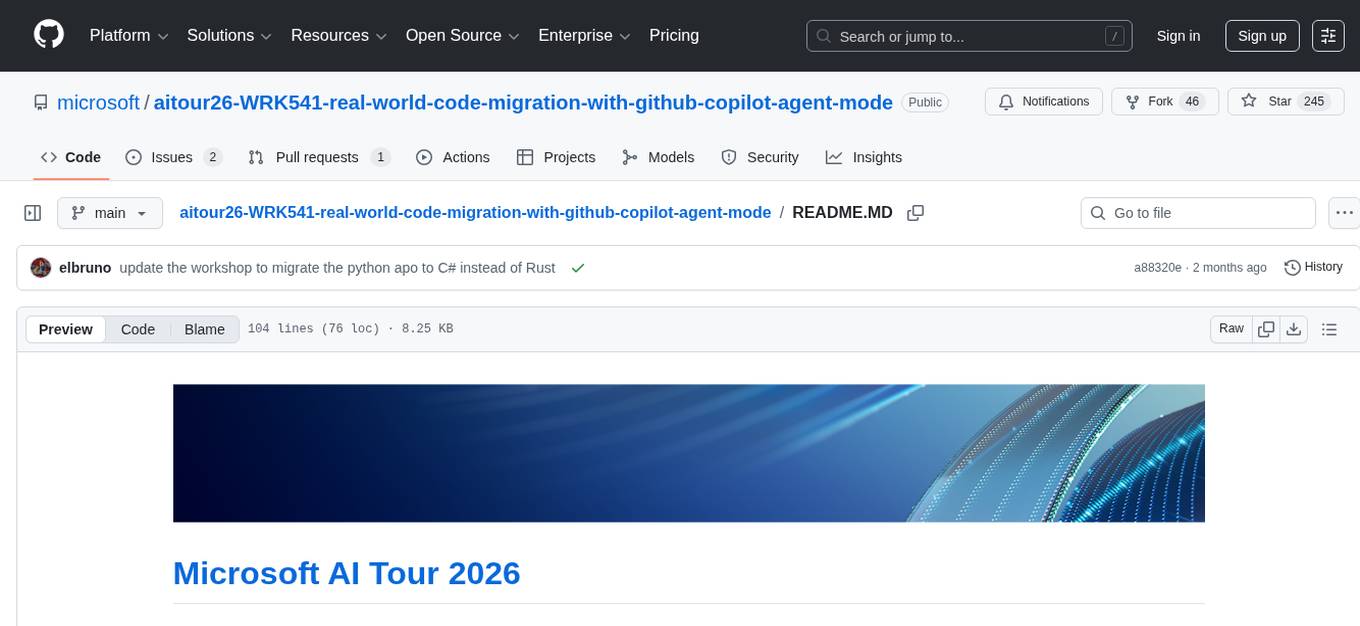
aitour26-WRK541-real-world-code-migration-with-github-copilot-agent-mode
Microsoft AI Tour 2026 WRK541 is a workshop focused on real-world code migration using GitHub Copilot Agent Mode. The session is designed for technologists interested in applying AI pair-programming techniques to challenging tasks like migrating or translating code between different programming languages. Participants will learn advanced GitHub Copilot techniques, differences between Python and C#, JSON serialization and deserialization in C#, developing and validating endpoints, integrating Swagger/OpenAPI documentation, and writing unit tests with MSTest. The workshop aims to help users gain hands-on experience in using GitHub Copilot for real-world code migration scenarios.
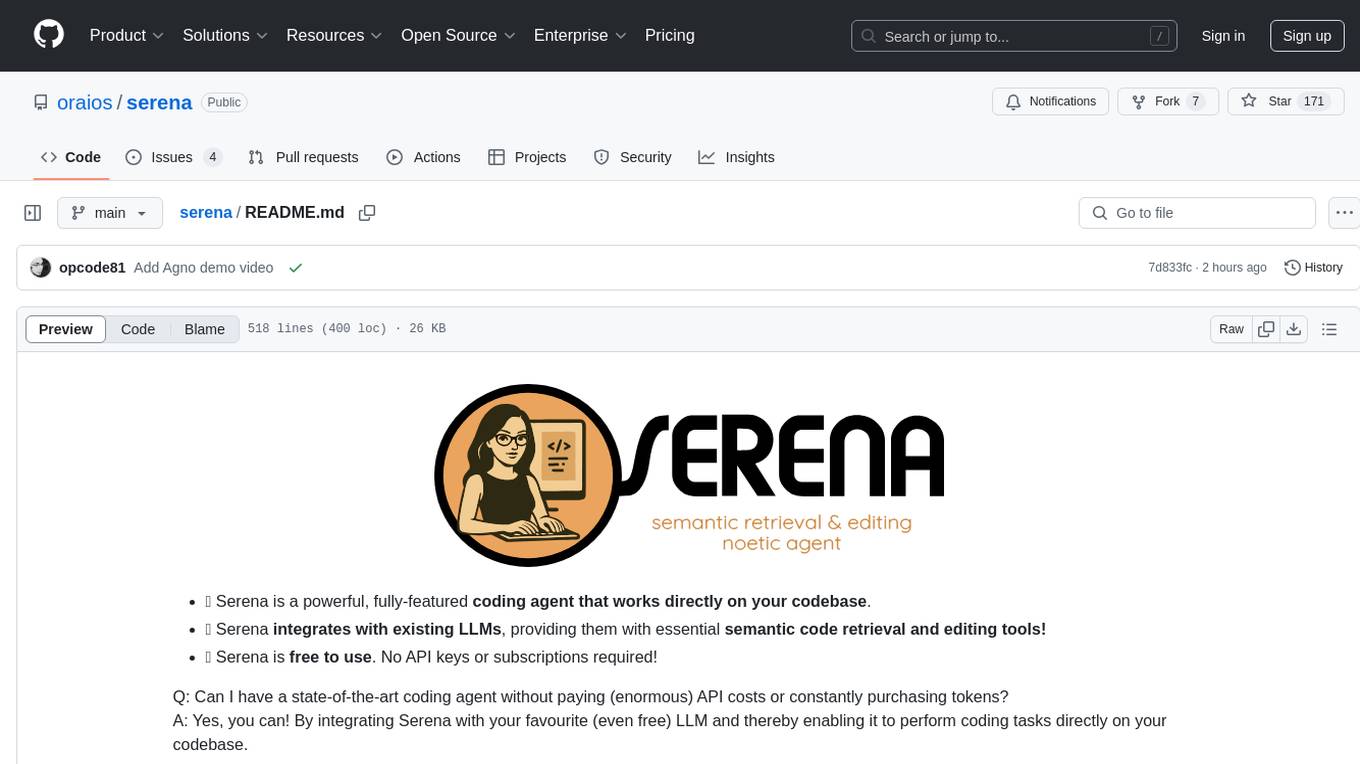
serena
Serena is a powerful coding agent that integrates with existing LLMs to provide essential semantic code retrieval and editing tools. It is free to use and does not require API keys or subscriptions. Serena can be used for coding tasks such as analyzing, planning, and editing code directly on your codebase. It supports various programming languages and offers semantic code analysis capabilities through language servers. Serena can be integrated with different LLMs using the model context protocol (MCP) or Agno framework. The tool provides a range of functionalities for code retrieval, editing, and execution, making it a versatile coding assistant for developers.
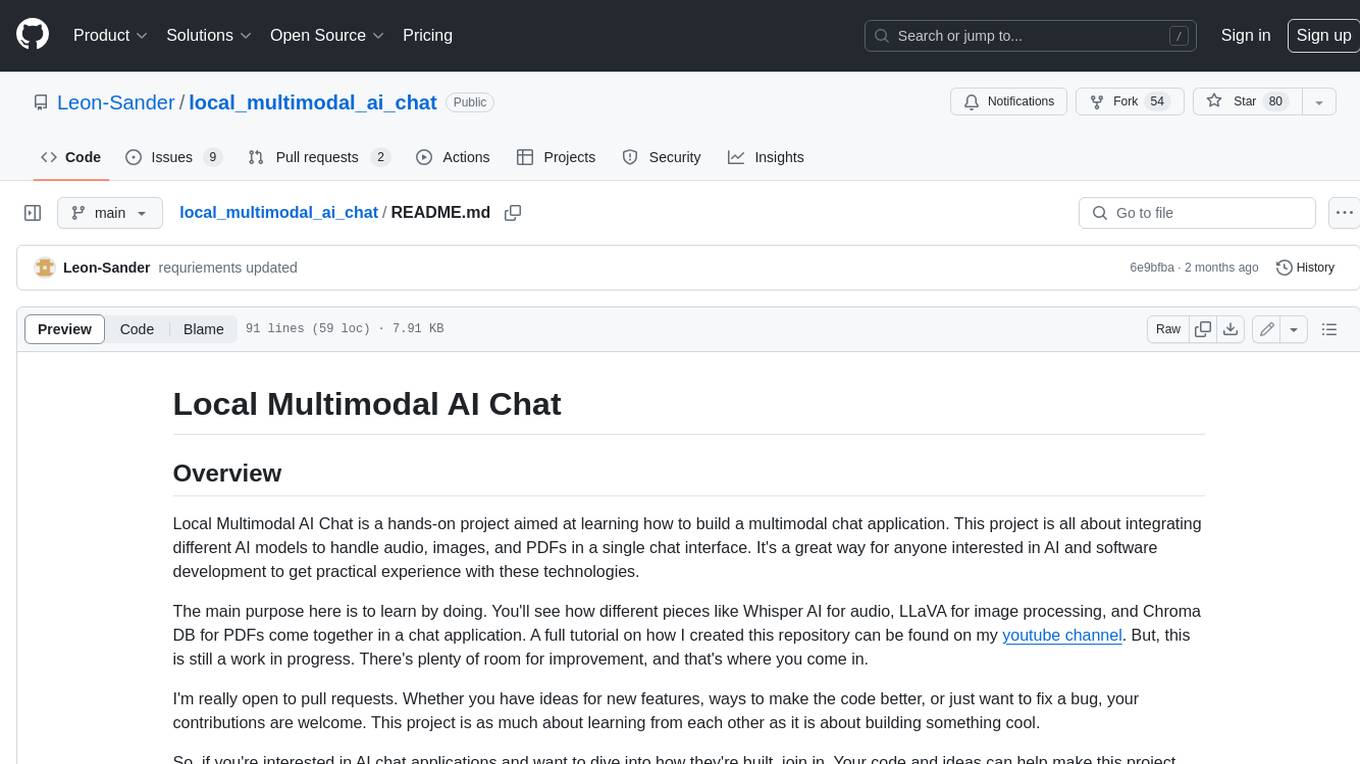
local_multimodal_ai_chat
Local Multimodal AI Chat is a hands-on project that teaches you how to build a multimodal chat application. It integrates different AI models to handle audio, images, and PDFs in a single chat interface. This project is perfect for anyone interested in AI and software development who wants to gain practical experience with these technologies.
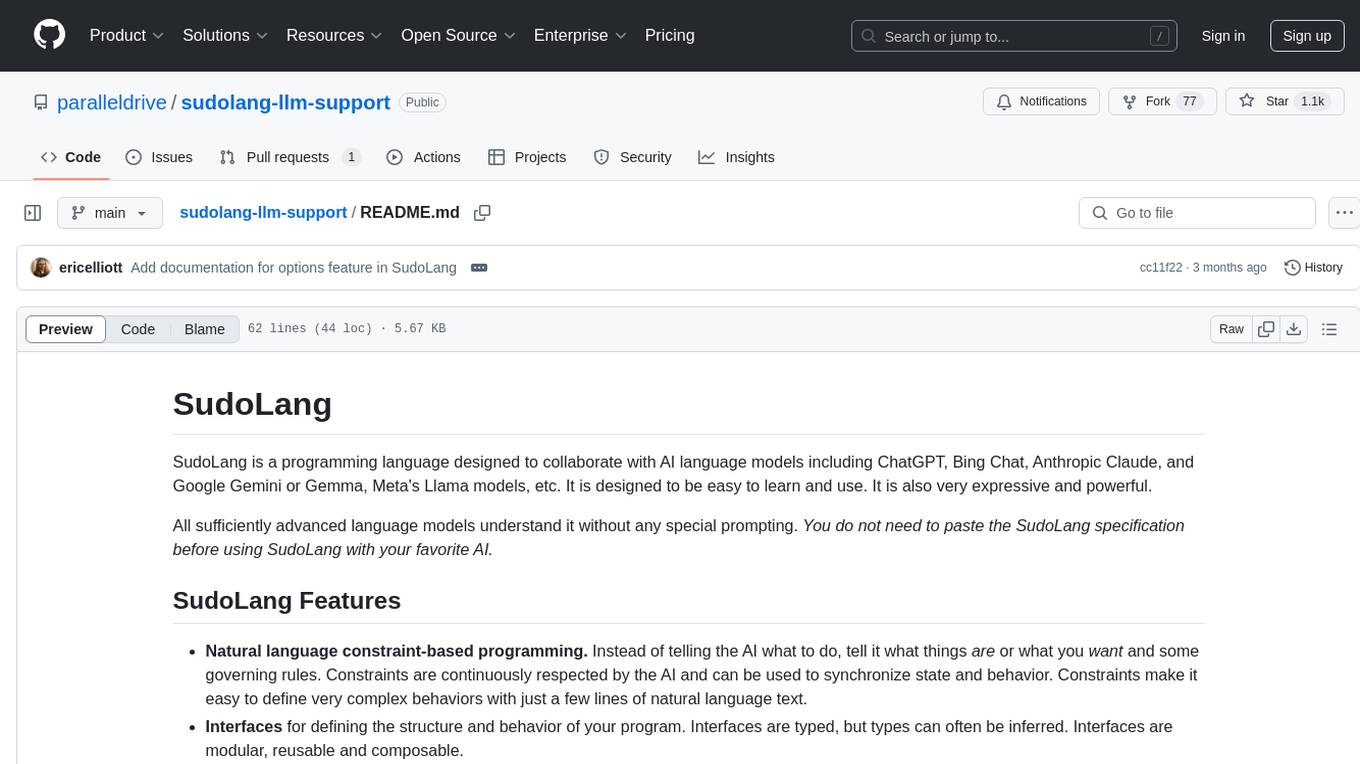
sudolang-llm-support
SudoLang is a programming language designed for collaboration with AI language models like ChatGPT, Bing Chat, Anthropic Claude, Google Gemini, Meta's Llama models, etc. It emphasizes natural language constraint-based programming, interfaces, semantic pattern matching, referential omnipotence, function composition, and Mermaid diagrams. SudoLang is easier to learn than traditional programming languages, improves reasoning performance, and offers a declarative, constraint-based, interface-oriented approach. It provides structured pseudocode for complex prompts, reducing prompting costs and response times.
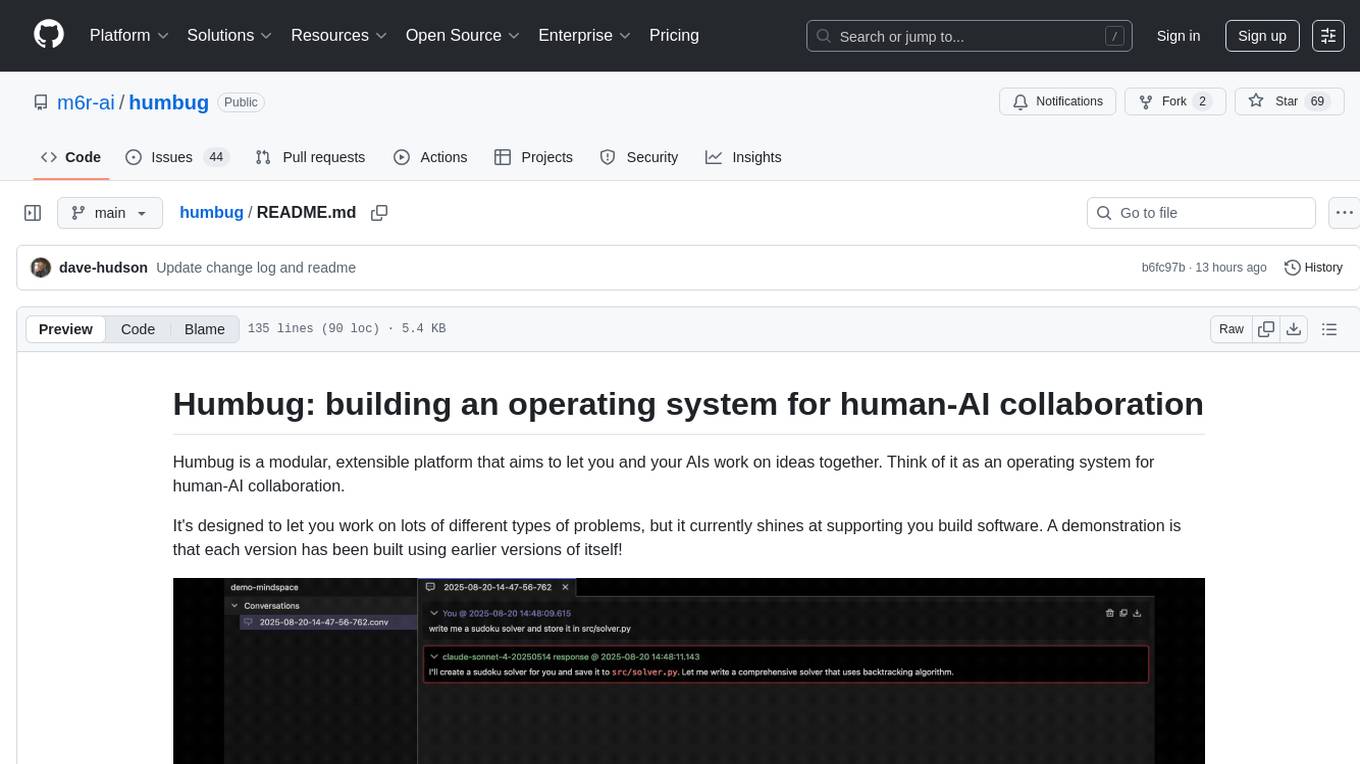
humbug
Humbug is a modular platform designed for human-AI collaboration, providing a project-centric workspace with multiple large language models, structured context engineering, and powerful, pluggable tools. It allows users to work on various problems, particularly in software development, with the flexibility to add new AI backends and tools. Humbug is open-source, OS-agnostic, and minimal in dependencies, offering a unified experience on Windows, macOS, and Linux.
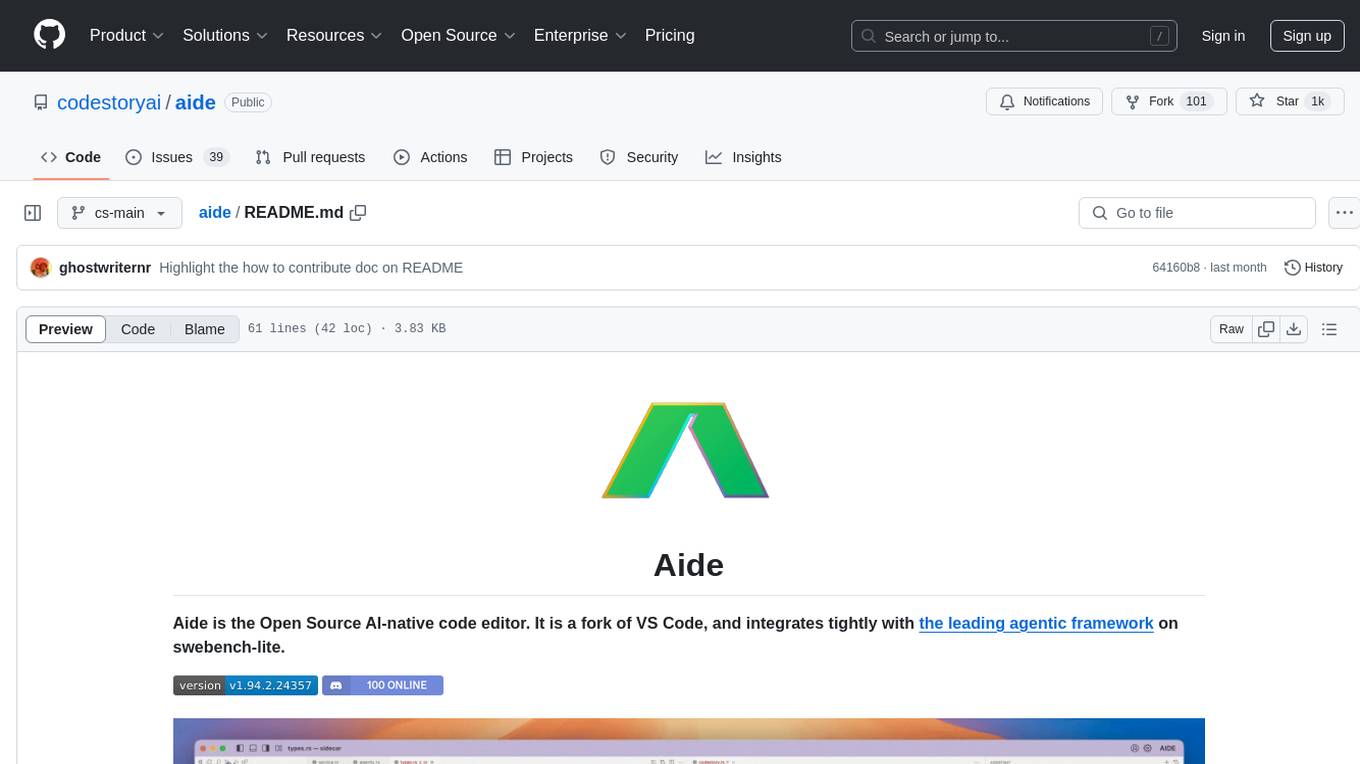
aide
Aide is an Open Source AI-native code editor that combines the powerful features of VS Code with advanced AI capabilities. It provides a combined chat + edit flow, proactive agents for fixing errors, inline editing widget, intelligent code completion, and AST navigation. Aide is designed to be an intelligent coding companion, helping users write better code faster while maintaining control over the development process.
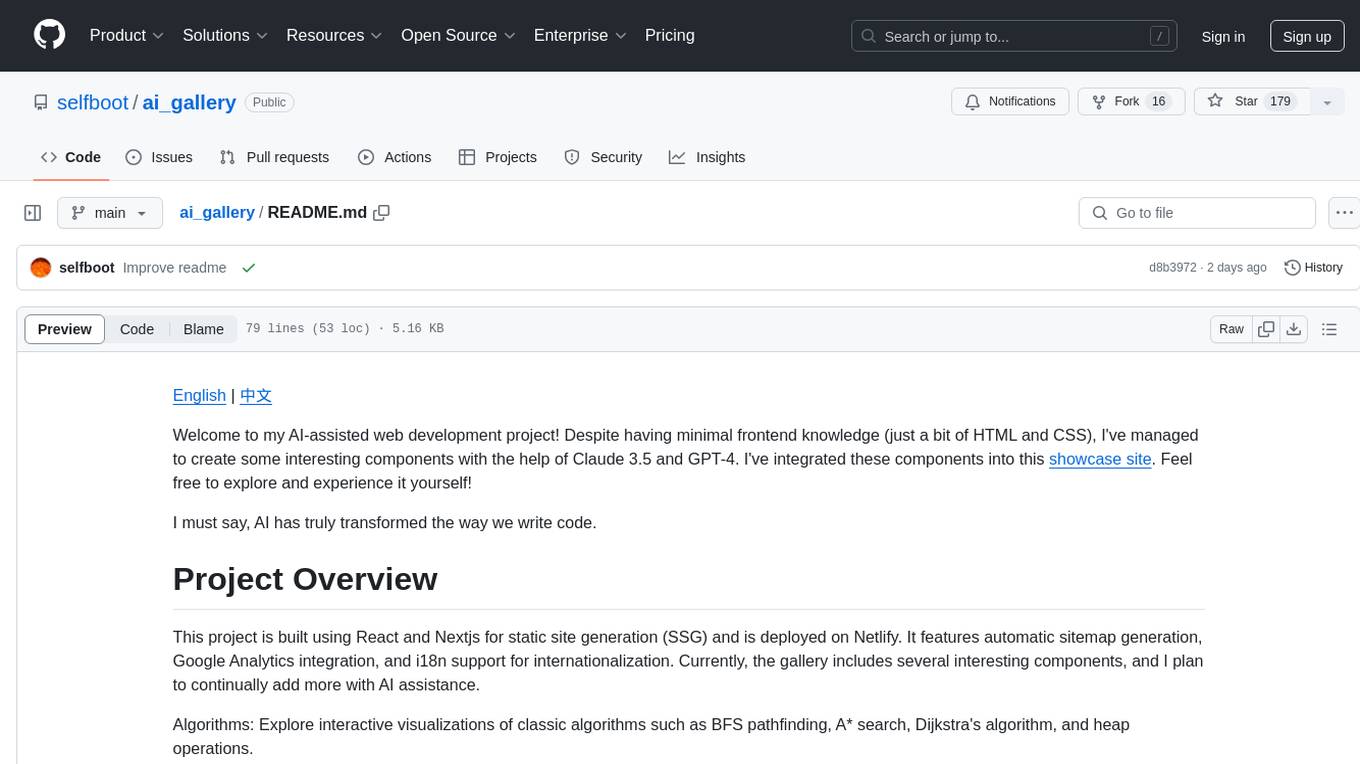
ai_gallery
AI Gallery is a showcase site built using React and Nextjs for static site generation, featuring interactive visualizations of classic algorithms, classic games implementation, and various interesting widgets. The project utilizes AI assistance from Claude 3.5 and GPT-4 to create components and enhance the development process. It aims to continually add more components with AI assistance, providing a platform for contributors to leverage AI in frontend development.
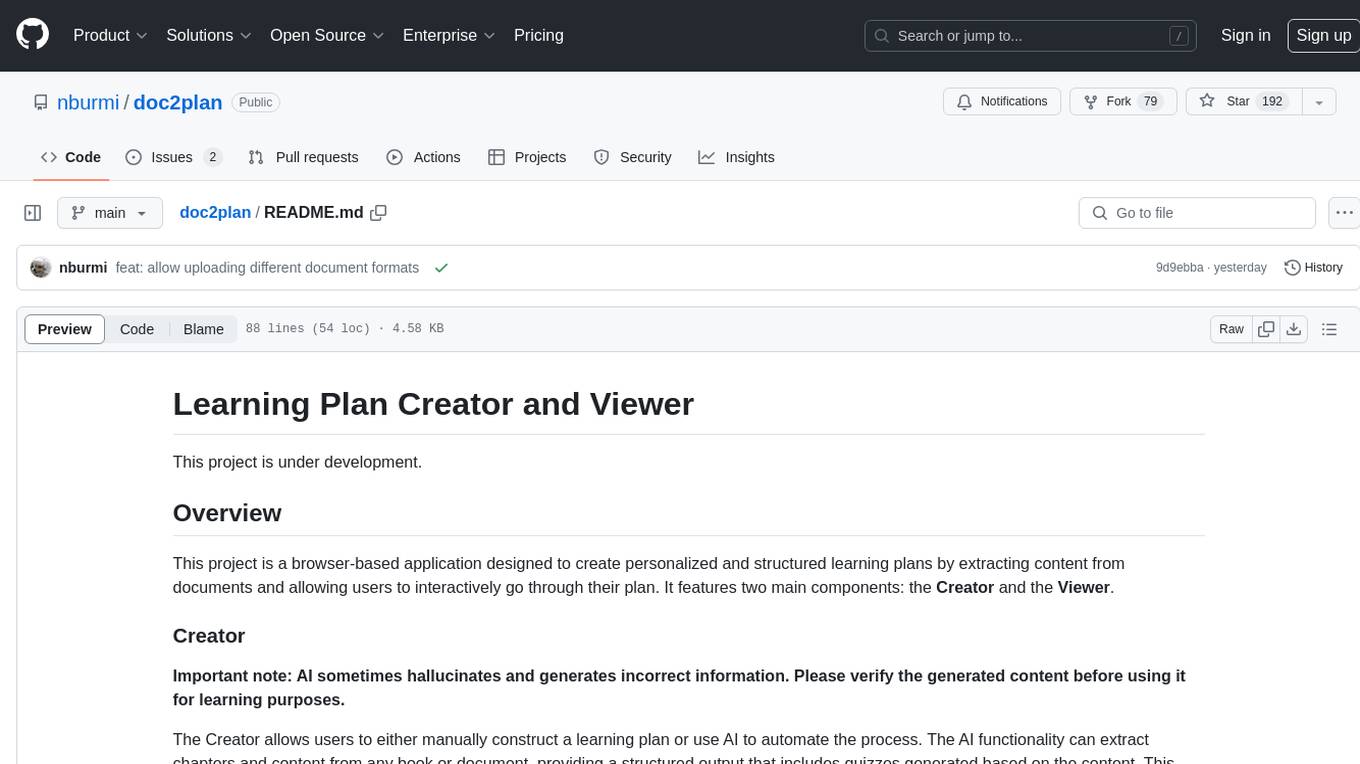
doc2plan
doc2plan is a browser-based application that helps users create personalized learning plans by extracting content from documents. It features a Creator for manual or AI-assisted plan construction and a Viewer for interactive plan navigation. Users can extract chapters, key topics, generate quizzes, and track progress. The application includes AI-driven content extraction, quiz generation, progress tracking, plan import/export, assistant management, customizable settings, viewer chat with text-to-speech and speech-to-text support, and integration with various Retrieval-Augmented Generation (RAG) models. It aims to simplify the creation of comprehensive learning modules tailored to individual needs.

coze-studio
Coze Studio is an all-in-one AI agent development tool that offers the most convenient AI agent development environment, from development to deployment. It provides core technologies for AI agent development, complete app templates, and build frameworks. Coze Studio aims to simplify creating, debugging, and deploying AI agents through visual design and build tools, enabling powerful AI app development and customized business logic. The tool is developed using Golang for the backend, React + TypeScript for the frontend, and follows microservices architecture based on domain-driven design principles.
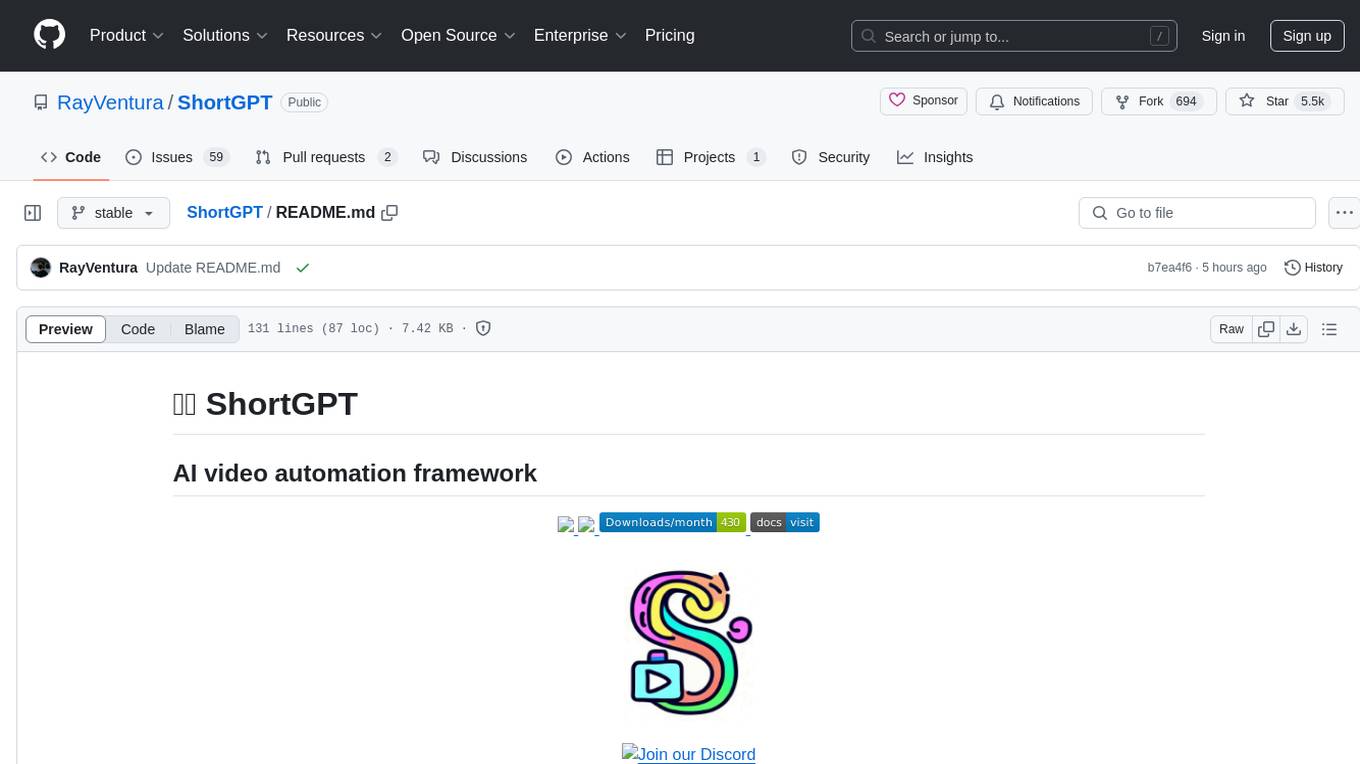
ShortGPT
ShortGPT is a powerful framework for automating content creation, simplifying video creation, footage sourcing, voiceover synthesis, and editing tasks. It offers features like automated editing framework, scripts and prompts, voiceover support in multiple languages, caption generation, asset sourcing, and persistency of editing variables. The tool is designed for youtube automation, Tiktok creativity program automation, and offers customization options for efficient and creative content creation.
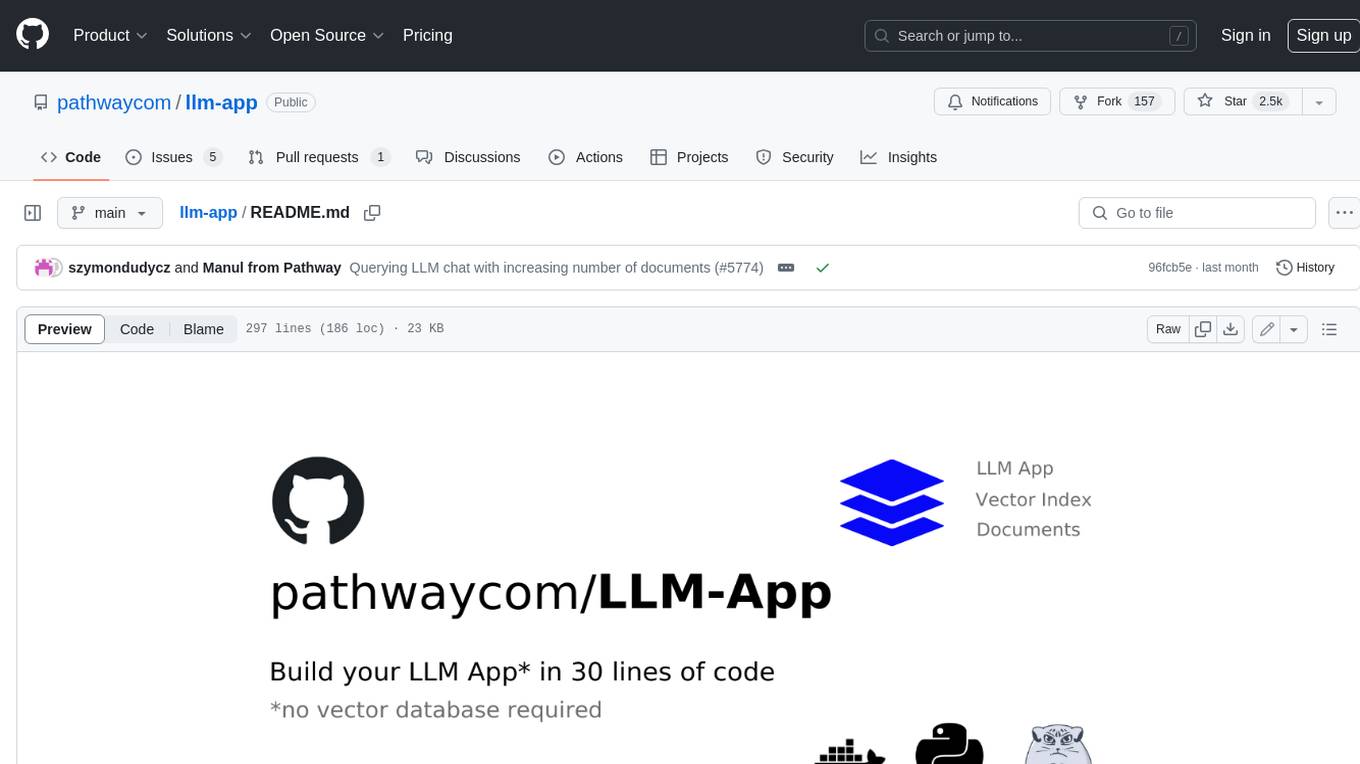
llm-app
Pathway's LLM (Large Language Model) Apps provide a platform to quickly deploy AI applications using the latest knowledge from data sources. The Python application examples in this repository are Docker-ready, exposing an HTTP API to the frontend. These apps utilize the Pathway framework for data synchronization, API serving, and low-latency data processing without the need for additional infrastructure dependencies. They connect to document data sources like S3, Google Drive, and Sharepoint, offering features like real-time data syncing, easy alert setup, scalability, monitoring, security, and unification of application logic.
For similar tasks
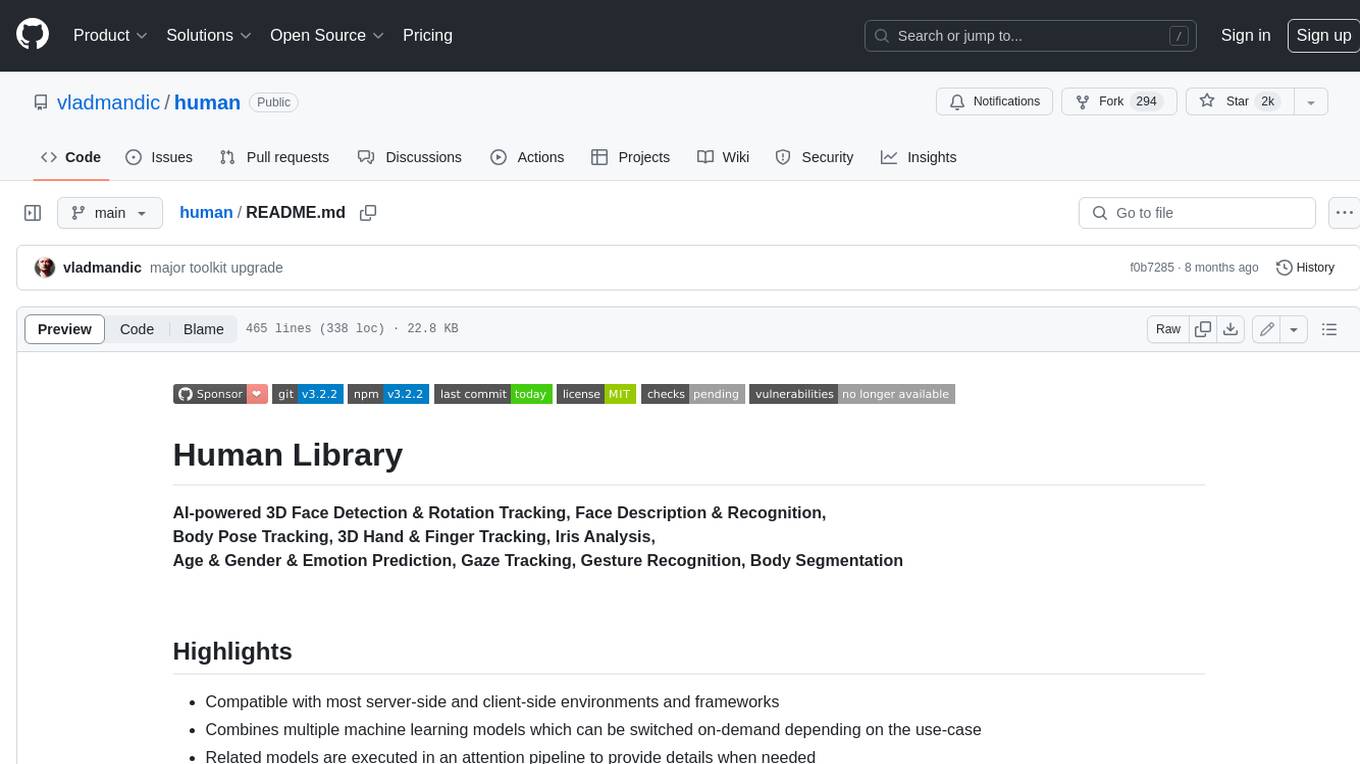
human
AI-powered 3D Face Detection & Rotation Tracking, Face Description & Recognition, Body Pose Tracking, 3D Hand & Finger Tracking, Iris Analysis, Age & Gender & Emotion Prediction, Gaze Tracking, Gesture Recognition, Body Segmentation
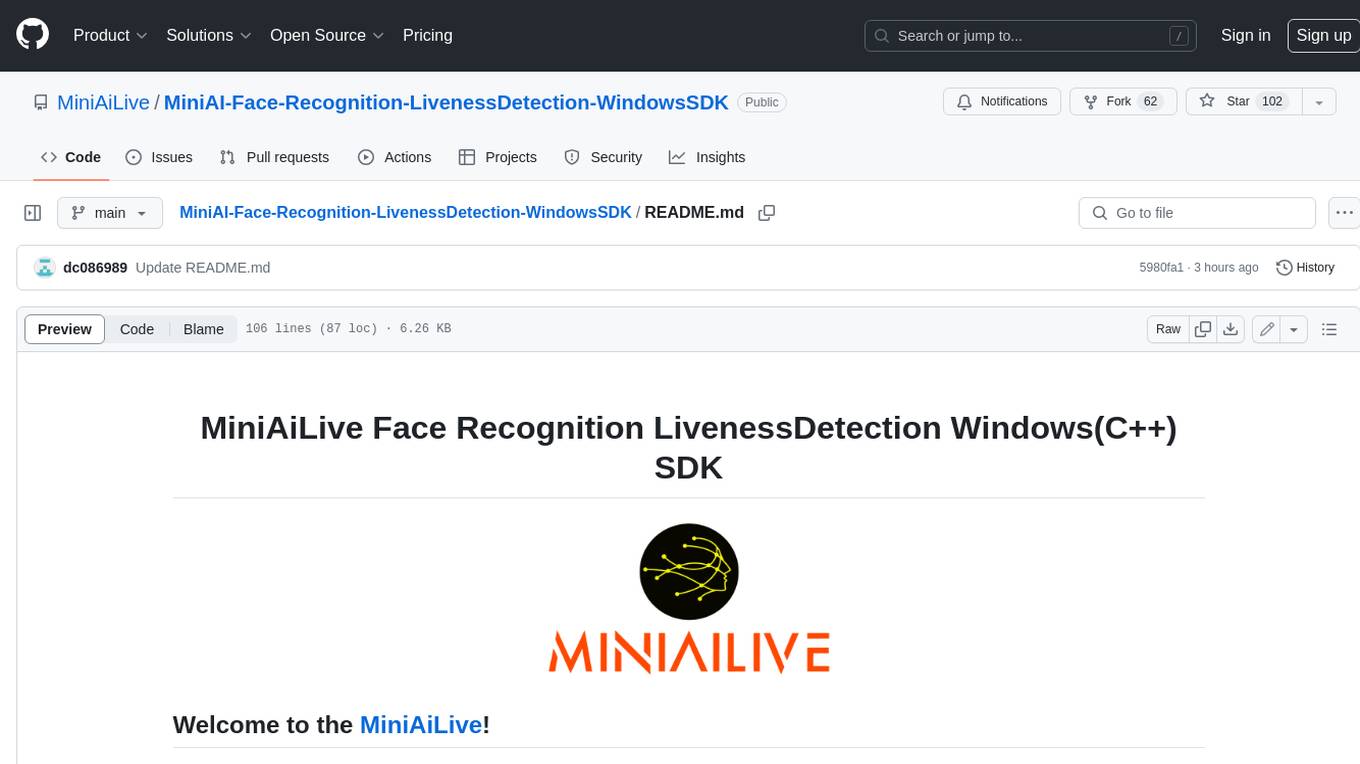
MiniAI-Face-Recognition-LivenessDetection-WindowsSDK
This repository contains a C++ application that demonstrates face recognition capabilities using computer vision techniques. The demo utilizes OpenCV and dlib libraries for efficient face detection and recognition with 3D passive face liveness detection (face anti-spoofing). Key Features: Face detection: The SDK utilizes advanced computer vision techniques to detect faces in images or video frames, enabling a wide range of applications. Face recognition: It can recognize known faces by comparing them with a pre-defined database of individuals. Age estimation: It can estimate the age of detected faces. Gender detection: It can determine the gender of detected faces. Liveness detection: It can detect whether a face is from a live person or a static image.
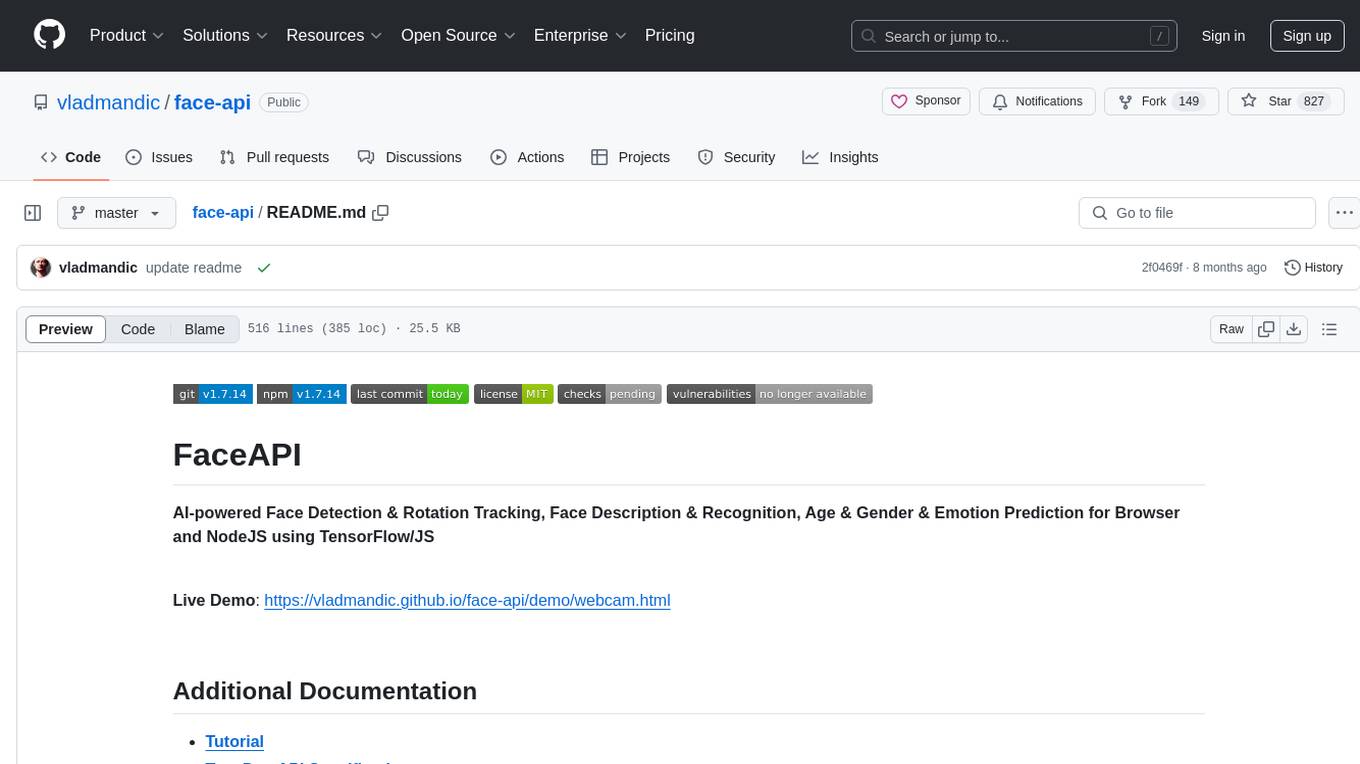
face-api
FaceAPI is an AI-powered tool for face detection, rotation tracking, face description, recognition, age, gender, and emotion prediction. It can be used in both browser and NodeJS environments using TensorFlow/JS. The tool provides live demos for processing images and webcam feeds, along with NodeJS examples for various tasks such as face similarity comparison and multiprocessing. FaceAPI offers different pre-built versions for client-side browser execution and server-side NodeJS execution, with or without TFJS pre-bundled. It is compatible with TFJS 2.0+ and TFJS 3.0+.
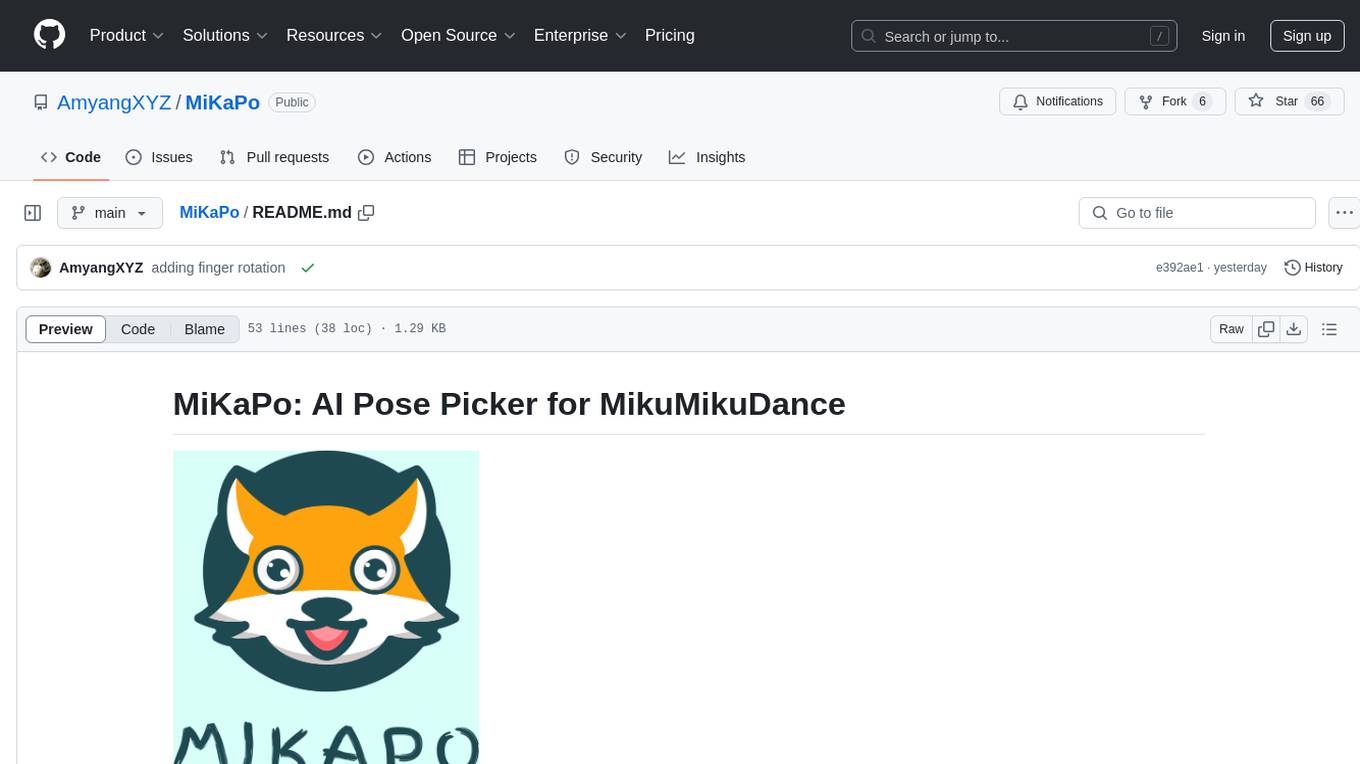
MiKaPo
MiKaPo is a web-based tool that allows users to pose MMD models in real-time using video input. It utilizes technologies such as Mediapipe for 3D key points detection, Babylon.js for 3D scene rendering, babylon-mmd for MMD model viewing, and Vite+React for the web framework. Users can upload videos and images, select different environments, and choose models for posing. MiKaPo also supports camera input and Ollama (electron version). The tool is open to feature requests and pull requests, with ongoing development to add VMD export functionality.
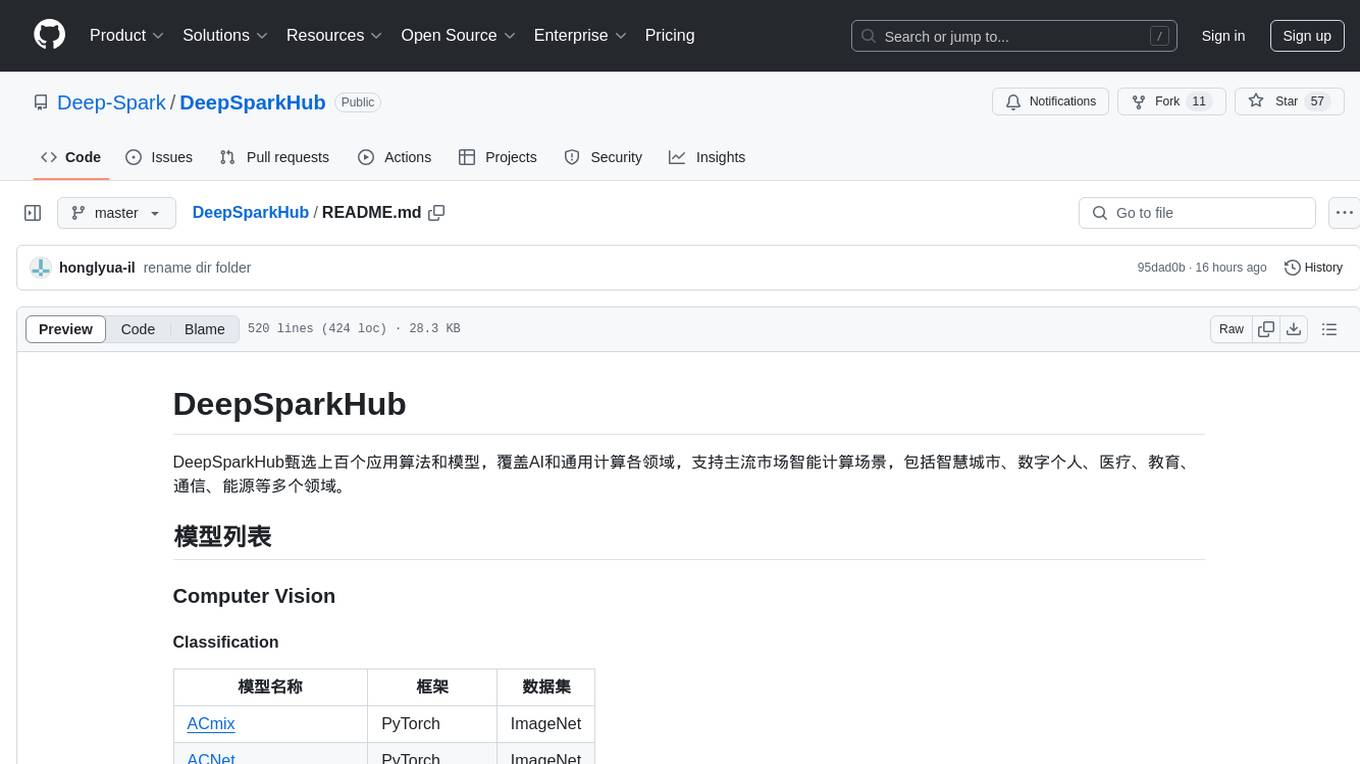
DeepSparkHub
DeepSparkHub is a repository that curates hundreds of application algorithms and models covering various fields in AI and general computing. It supports mainstream intelligent computing scenarios in markets such as smart cities, digital individuals, healthcare, education, communication, energy, and more. The repository provides a wide range of models for tasks such as computer vision, face detection, face recognition, instance segmentation, image generation, knowledge distillation, network pruning, object detection, 3D object detection, OCR, pose estimation, self-supervised learning, semantic segmentation, super resolution, tracking, traffic forecast, GNN, HPC, methodology, multimodal, NLP, recommendation, reinforcement learning, speech recognition, speech synthesis, and 3D reconstruction.
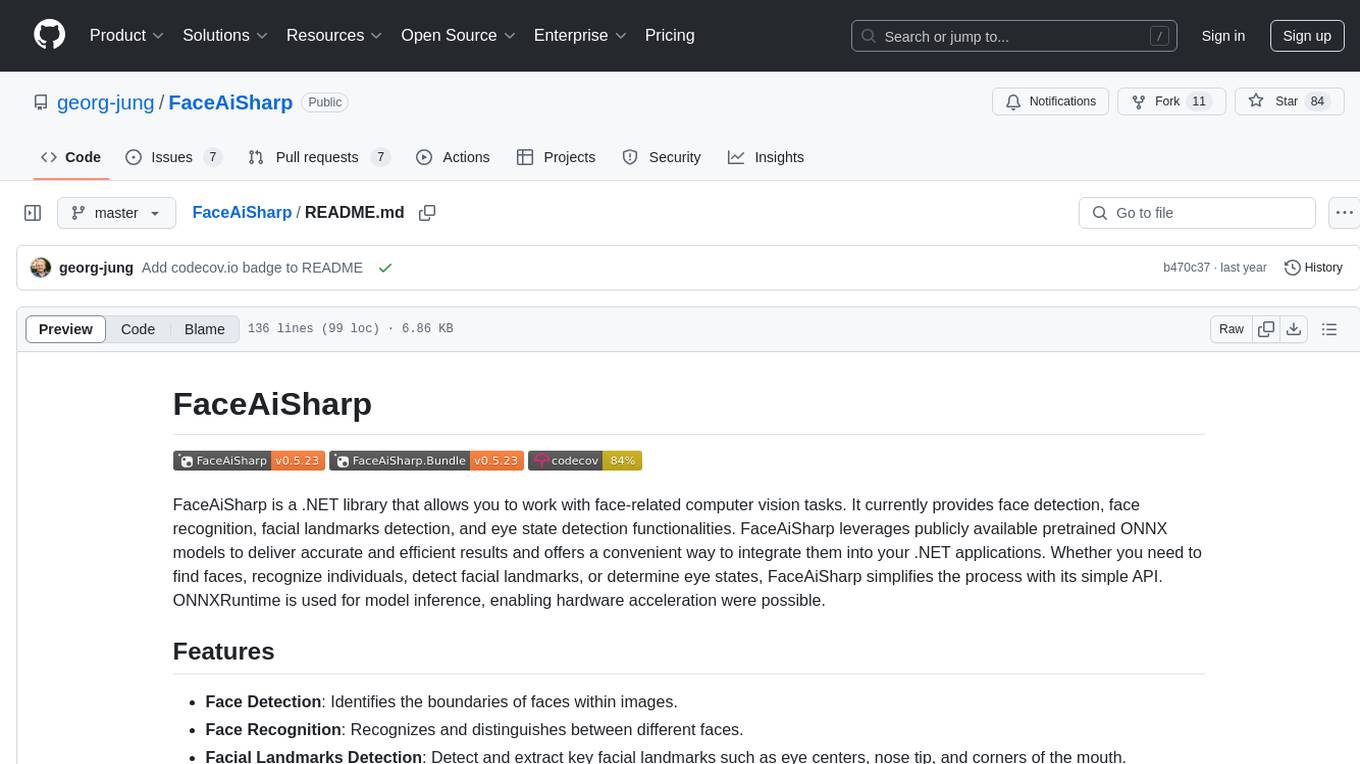
FaceAiSharp
FaceAiSharp is a .NET library designed for face-related computer vision tasks. It offers functionalities such as face detection, face recognition, facial landmarks detection, and eye state detection. The library utilizes pretrained ONNX models for accurate and efficient results, enabling users to integrate these capabilities into their .NET applications easily. With a focus on simplicity and performance, FaceAiSharp provides a local processing solution without relying on cloud services, supporting image-based face processing using ImageSharp. It is cross-platform compatible, supporting Windows, Linux, Android, and more.

Symposium2023
Symposium2023 is a project aimed at enabling Delphi users to incorporate AI technology into their applications. It provides generalized interfaces to different AI models, making them easily accessible. The project showcases AI's versatility in tasks like language translation, human-like conversations, image generation, data analysis, and more. Users can experiment with different AI models, change providers easily, and avoid vendor lock-in. The project supports various AI features like vision support and function calling, utilizing providers like Google, Microsoft Azure, Amazon, OpenAI, and more. It includes example programs demonstrating tasks such as text-to-speech, language translation, face detection, weather querying, audio transcription, voice recognition, image generation, invoice processing, and API testing. The project also hints at potential future research areas like using embeddings for data search and integrating Python AI libraries with Delphi.
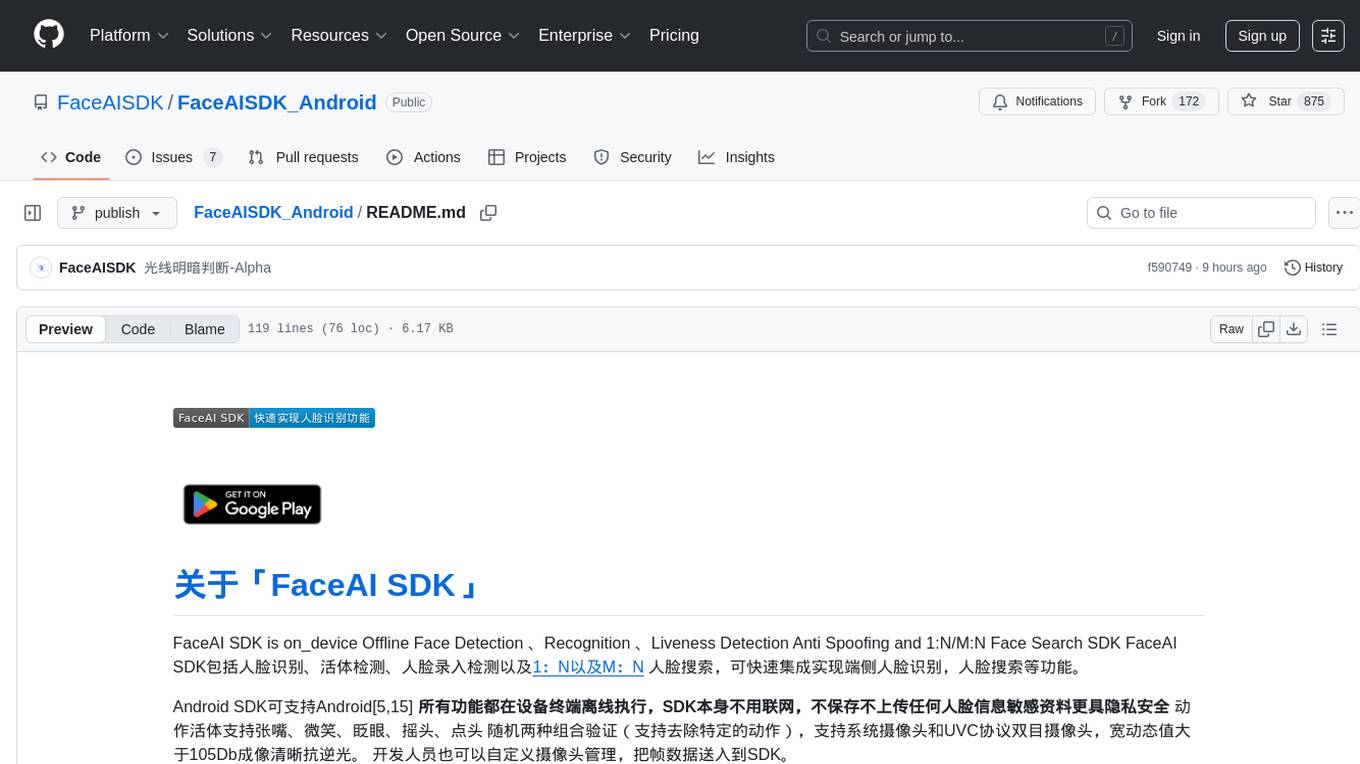
FaceAISDK_Android
FaceAI SDK is an on-device offline face detection, recognition, liveness detection, anti-spoofing, and 1:N/M:N face search SDK. It enables quick integration to achieve on-device face recognition, face search, and other functions. The SDK performs all functions offline on the device without the need for internet connection, ensuring privacy and security. It supports various actions for liveness detection, custom camera management, and clear imaging even in challenging lighting conditions.
For similar jobs

sweep
Sweep is an AI junior developer that turns bugs and feature requests into code changes. It automatically handles developer experience improvements like adding type hints and improving test coverage.

teams-ai
The Teams AI Library is a software development kit (SDK) that helps developers create bots that can interact with Teams and Microsoft 365 applications. It is built on top of the Bot Framework SDK and simplifies the process of developing bots that interact with Teams' artificial intelligence capabilities. The SDK is available for JavaScript/TypeScript, .NET, and Python.

ai-guide
This guide is dedicated to Large Language Models (LLMs) that you can run on your home computer. It assumes your PC is a lower-end, non-gaming setup.

classifai
Supercharge WordPress Content Workflows and Engagement with Artificial Intelligence. Tap into leading cloud-based services like OpenAI, Microsoft Azure AI, Google Gemini and IBM Watson to augment your WordPress-powered websites. Publish content faster while improving SEO performance and increasing audience engagement. ClassifAI integrates Artificial Intelligence and Machine Learning technologies to lighten your workload and eliminate tedious tasks, giving you more time to create original content that matters.

chatbot-ui
Chatbot UI is an open-source AI chat app that allows users to create and deploy their own AI chatbots. It is easy to use and can be customized to fit any need. Chatbot UI is perfect for businesses, developers, and anyone who wants to create a chatbot.

BricksLLM
BricksLLM is a cloud native AI gateway written in Go. Currently, it provides native support for OpenAI, Anthropic, Azure OpenAI and vLLM. BricksLLM aims to provide enterprise level infrastructure that can power any LLM production use cases. Here are some use cases for BricksLLM: * Set LLM usage limits for users on different pricing tiers * Track LLM usage on a per user and per organization basis * Block or redact requests containing PIIs * Improve LLM reliability with failovers, retries and caching * Distribute API keys with rate limits and cost limits for internal development/production use cases * Distribute API keys with rate limits and cost limits for students

uAgents
uAgents is a Python library developed by Fetch.ai that allows for the creation of autonomous AI agents. These agents can perform various tasks on a schedule or take action on various events. uAgents are easy to create and manage, and they are connected to a fast-growing network of other uAgents. They are also secure, with cryptographically secured messages and wallets.

griptape
Griptape is a modular Python framework for building AI-powered applications that securely connect to your enterprise data and APIs. It offers developers the ability to maintain control and flexibility at every step. Griptape's core components include Structures (Agents, Pipelines, and Workflows), Tasks, Tools, Memory (Conversation Memory, Task Memory, and Meta Memory), Drivers (Prompt and Embedding Drivers, Vector Store Drivers, Image Generation Drivers, Image Query Drivers, SQL Drivers, Web Scraper Drivers, and Conversation Memory Drivers), Engines (Query Engines, Extraction Engines, Summary Engines, Image Generation Engines, and Image Query Engines), and additional components (Rulesets, Loaders, Artifacts, Chunkers, and Tokenizers). Griptape enables developers to create AI-powered applications with ease and efficiency.



